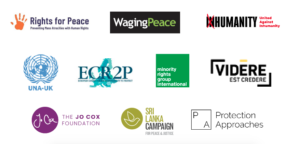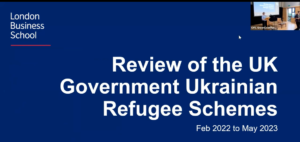Dr Jeff Crisp is an Associate Fellow at Chatham House and a Research Associate at the Refugee Studies Centre at the University of Oxford.
The following is a transcript of the Keynote Presentation, made by Dr Jeff Crisp, at the AGM of UAI in the UK held on 30 June 2021.
Introduction
Take a look around Europe and you will find many disturbing examples of the cruel way in which refugees and asylum seekers are being treated. For example:
- overcrowded camps on the Greek islands where refugees are deprived of their liberty for months on end and are obliged to live in dangerous and insanitary conditions while waiting for a solution to their plight.
- the EU-supported interception of refugees and migrants in the Mediterranean Sea and their forced return to detention centres in Libya, where they are routinely abused and exploited.
- recently erected fences on the borders of Croatia, Hungary and Serbia, and the brutalization of people moving through those countries by the military, the police and vigilante groups.
- periodic evictions and round-ups of foreign nationals who have made their way to northern France, and the UK’s refusal to admit unaccompanied minor children who have close relatives already living on the other side of the English Channel.
As these examples suggest, the inhumanity of Europe’s refugee and asylum policies has become increasingly institutionalized over the past five years, despite (or perhaps, more accurately, because of) an incessant round of summit meetings, declarations, agreements and deals, all of them ostensibly designed to attain the holy grail of what European states refer to as ‘effective migration management’.
A new EU pact
Last year, the EU made its most recent attempt to address this issue, introducing a ‘Pact on Migration and Asylum’ whose publication was brought forward as a result of the fire that had just destroyed the Moria refugee camp on the Greek island of Lesvos. Describing the Pact as a “fresh start” to the issue, EU Commission President Ursula von der Leyen stated that “it is now time to rise to the challenge to manage migration jointly, with the right balance between solidarity and responsibility.”
Such inscrutable comments cannot conceal the fact that this latest EU initiative has some fundamental weaknesses and negative components. While described as a ‘Pact’, it is by no means a done deal. Hungary and other members of the hardline nationalist Visegrad Group (the Czech Republic, Poland and Slovakia) immediately expressed their opposition to it and continue to fear that it will oblige them to admit specific quotas of refugees, an arrangement that they have consistently and vehemently rejected.
The title of the new Pact is also misleading. What the document does not do is to set out a comprehensive vision of the role that migration, especially the mobility of employees, entrepreneurs, and students, might play in the EU’s future development strategy, both at home and abroad. Indeed, the initiative would more accurately be described as a ‘Pact to exclude asylum-seekers from countries outside the EU, especially in Africa, Asia and the Middle East.’, such is its fixation with that issue.
The Pact is disingenuous in several other respects. First, it states that “since 2014, attempts to reach Europe on unseaworthy vessels have increased, with many lives lost at sea. This has prompted the EU, Member States, and private actors to significantly step up maritime search and rescue capacity in the Mediterranean.” In fact, the EU has systematically withdrawn its own search and rescue assets, while making it increasingly difficult for NGOs to save lives at sea and to disembark passengers in a safe and timely manner.
Second, there is little doubt that the EU’s not-so-fresh-start will make it even more difficult for refugees to “seek and enjoy asylum” in Europe, as they are entitled to do in the language of the Universal Declaration on Human Rights. Under the terms of the Pact, for example, the EU “will strengthen cooperation with countries of origin and transit to prevent irregular crossings.” In other words, it will continue to be directly implicated in the process of interception, forced return and abusive detention in Libya. An asylum seeker who arrives at the borders of Europe will be refused admission if “the overall condition of the person appears to be very good.” Similarly, asylum applicants with low chances of being accepted will be denied legal entry, and are likely to end up in squalid settlements on the borders of the EU.
Third, the Pact places enormous emphasis on the return of asylum seekers and other migrants to their country of origin if they are deemed to have no entitlement to remain in the EU. While there is nothing new about this issue, the Pact proposes a much more aggressive (and consequently more risky) approach to this objective, involving a “leading role” for Frontex, the EU’s controversial and compromised border agency.
Finally, and in a very poorly articulated part of the document, the Pact suggests that EU countries such as Hungary, that refuse to accept the relocation of refugees to their territory, would instead be able to assume responsibility for organizing and funding the return (i.e. deportation) of asylum seekers without a right to stay in other member states. In other words, a dangerous and negative new twist on the notion of ‘solidarity’.
UK refugee policy
While it is no longer a member of the EU, the institutionalization of inhumanity in European refugee policy has been particularly evident in the case of the UK.
Despite all the suffering that it has caused, not only to refugees but also to people with an entitlement to British citizenship, nothing has been done to dismantle the government’s self-proclaimed ‘hostile environment’ policy, which seeks to make life as difficult as possible for asylum seekers and which turns institutions such as banks, schools, hospitals, and colleges into the agents of that strategy.
Indeed, Home Secretary Priti Patel has done everything in her power to reinforce the Hostile Environment, housing asylum seekers in decrepit and COVID-prone military barracks, mobilizing the media and public opinion against the tiny number of people arriving irregularly in the UK by boat, and appointing a ludicrously named ‘Clandestine Channel Threat Commander’, whose job is to make sure that those people are intercepted and forcibly returned to the continent.
More generally, Patel has taken the position that asylum seekers who arrive in the UK independently are illegitimate, and should be systematically treated less favourably than those who reach the UK by means of the country’s refugee resettlement programme. Using statistics in a particularly creative (i.e. misleading) way, she falsely claims that the UK has admitted more refugees than any other European country in recent years, and suggests (falsely again) that ‘genuine refugees’ have the option of reaching the country by safe and legal routes. In fact, only 353 refugees have been admitted to the UK by such means in the past 12 months, while the country’s longstanding annual refugee resettlement quota has been scrapped entirely.
Another hallmark of Patel’s strategy has been to leak headline-grabbing policy initiatives to the tabloid press in order to consolidate the support of the Conservative Party’s new base and to give the impression that the government is prepared to introduce draconian measures in its efforts to tackle the issue of so-called ‘illegal immigration’.
Thus, over the past few months we have been told that the government was looking into the possibility of deploying giant wave machines in the Channel, making it impossible for refugees to land on British territory. We have witnessed the prosecution of asylum seekers who have steered boats from France to the UK, under the false allegation that they are engaging in human smuggling and trafficking. We have heard unconvincing suggestions that the government is to strike deals with EU states, allowing new arrivals to be immediately returned there, rather than having their refugee claims examined in the UK. And we have been fed a succession of unlikely stories about the impending deportation and detention of asylum seekers in unlikely destinations such as the Falkland Islands, Gibraltar, Saint Helena, and, most recently Rwanda.
Looking to the future
The good news is that many of the ideas outlined above have been considered by previous governments and have ultimately been rejected on legal, ethical, operational, financial, and foreign policy grounds. There is, I would like to think, a very real possibility that Priti Patel’s proposals will meet the same ignominious fate.
The bad news is that the Johnson administration has decided that the refugee, asylum and migration issue has a central role to play in the crass Culture War that the government is now waging. And if the government’s recent activities are anything to go by, that war will be fought at any cost in terms of its legality, its effectiveness, its consequences for the Treasury and Foreign Office, not to mention its cruelty to people who are seeking and are entitled to protection. In that respect, I believe that United Against Inhumanity (UAI), at both the global and UK levels, has an important role to play in advocating for decent refugee and asylum policies.
In doing so, three issues should be kept in mind.
First, UAI should establish an effective line of communication with UNHCR, both in London and Geneva. I might not have made that suggestion nine months ago, when the organization appeared to be intimidated by the Trump administration and compromised in its relationship with the EU. But more recently UNHCR has found its voice again, taking a firm stand in relation to the asylum policies pursued by major donors such as Australia, Denmark, the UK, and USA. That is a welcome development that UAI should support by every means possible.
Second, refugee advocacy tends to be somewhat negative in tone, criticizing the many states that fail in their responsibility towards those who have been displaced by persecution and armed conflict. Such criticism is necessary, of course, but it should also be matched by an acknowledgement that some countries have set a good example to the rest of the international community: Canada, which has pioneered the use of community-sponsored resettlement; Colombia, which has granted residence and other rights to a very large number of Venezuelans; Germany, which kept its borders open at the height of the refugee influx in Europe in 2015-16; and Uganda, which despite its negative human rights record, has endeavoured to accommodate refugees from a number of neighbouring states, providing them with land, the right to work and freedom of movement. Let us encourage other governments, including that of the UK, to follow these examples.
Finally, UAI should reach out to the many people in the UK who have a positive perception of refugees and who believe that it is the country’s responsibility to treat them in a humane manner. Particular attention should be given to younger people, many of whom abhor Johnson and Patel’s politics of division and who, using new technologies and organizing methods, are well placed to challenge the negative narrative about refugees disseminated by too many politicians and by dominant parts of the British media.
30 June 2021










